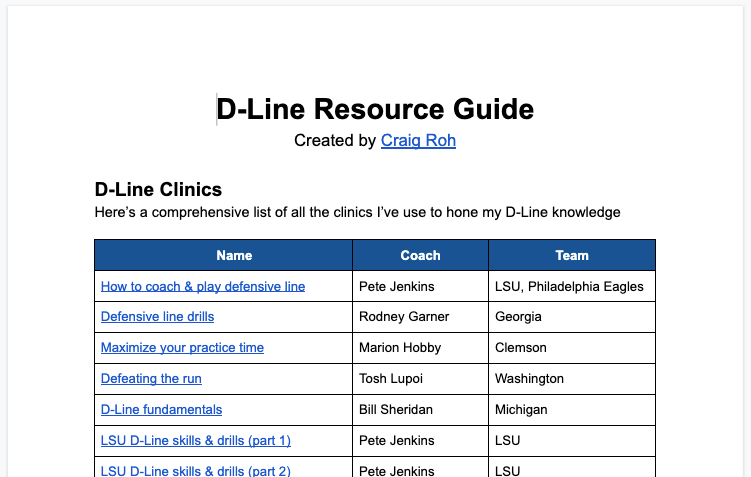Five traits of annoying coaches
Hello and welcome to another edition of the D-Line Examples newsletter. My name is Craig, and each week I humbly tackle reader questions about how to coach and play defensive line. If you have any questions DM me on my Twitter and in return, I’ll offer actionable real-world advice.
Q: I’m new to coaching and I worry sometimes that I’m frustrating or annoying my team without knowing it. I want to avoid that, while still doing a great job. What should I be watchful for?
Coaching seems to be one of the most disliked professions in all of sports. Case in point. When I asked,
I got this response from my former UMich teammate Zoltan Mesko…
Coaches are often seen as arrogant, narrow-minded and, worst of all, unnecessary. This makes me sad. But it also tells me that many people simply haven’t ran into a great coach.
In my experience, great coaches make everything better: They up-level their players, give actionable tips, know exactly how to solve problems and inspire their players to make amazing plays on game day.
But coaches often shoot themselves in the foot (and thus make all coaches look bad) by being, as you suggested, annoying.
To help you avoid this, below I’ll cover the 5 traits of highly ineffective coaches, and how to avoid them:
Berates players when they make mistakes
Uses complex terminology
Unwilling to try anything new
Unprepared for practice
Doesn’t explain the how
Let’s dive in.
Five traits of highly ineffective coaches
1. Berates players when they make mistakes
By far the best way to become a highly ineffective coach is to constantly yell and MF your players. When I asked what annoys you most about coaches on Twitter, this trait came up more than any other…

Trust me, I know nothing is more frustrating than showing a player step-by-step how to execute a new technique and then they go off and do their own thing, but if your consistent response is to yell at your guys every time they make a mistake eventually raising your voice will lose it’s effectiveness.
The job of a coach is not only to teach a new skills, but constantly reinforce these skills through practice and visuals. People don’t acquire new skills instantly. Often, it takes weeks, months and sometimes years for the pieces of the puzzle to come together and it’s your job as a coach to help that process.
As the great Zig Ziglar said,
“Repetition is the mother of learning, the father of action, which makes it the architect of accomplishment”
No one said this was an easy job, but all the greatest coaches coach from a place of servant leadership where they understand the process to develop players is a long and arduous one that takes patience, perseverance and skill.
2. Uses complex terminology
One of the best D-Line coaches to have ever coached, Pete Jenkins said this about how to use words when coaching…
“Word’s paint pictures in the players minds”
By drilling concepts down to the most simple nugget you can quickly and effectively communicate concepts to your players and staff.
On the other hand, if you’ve gone to one too many coaching clinics you may want to show off your new vernacular. Unfortunately, that’s a great way to confuse everyone around you and drive your staff nuts.

The sole purpose of terminology is to create a shared language to quickly communicate concepts so everyone’s on the same page.
So rather than using phrases and terms that only a few coaches have heard of, it’s best to use language that everyone around you understands and can absorb.
3. Unwilling to try new things
Given that the rules of football haven’t changed substantially in decades, it’s very easy for coaches to get stuck in their ways. Here’s a few people who have ran into these types of coaches…



Now I’m no veteran. I’m a 30 year old who’s just started his journey into coaching, but one thing I do know is that schemes, players and the game of football itself changes every single year and if you don’t adapt, you’ll get left behind.
Take Bill Belicheck and Nick Saban. These two are arguably the greatest coaches of all time and they take time every off-season to talk and learn from one another.
Do you think you’re smarter than these two? I know I’m not. So why not listen to those who have new ideas around you.
Now I’m not saying that every idea is a gem, but gleaning what is useful and adding it to your repertoire only can make you and your team stronger. The below quote from Bruce Lee sums this up perfectly…
“Absorb what is useful, discard what is useless and add what is uniquely your own”
4. Unprepared for practice
Being a great coach takes a lot of work. Not only are you responsible for improving your position group, but you also need to strategize against your opponent, watch loads of film, put a full game plan together and teach it in less than a week. That’s a ton of stuff!
Now it’s more than likely that just about everyone on your staff is putting in a few late nights to make sure they get all this work done. So if you’re the one who shows up to practice unprepared, it will grind the gears of your fellow coaches like nothing else.


If you want your team to commit themselves to excellence you yourself have to be committed as well. I’m sure though there’s coaches out there who are committed, but don’t yet have a system to quickly teach their players how to improve their skills.
If this is the case for you, you should check out my books The Block Destruction Bible & The Pass Rush Bible. They give step by step instruction on how to improve your D-Line’s ability to pass rush and destroy blocks.
5. Doesn’t explain the how
Throughout my football career I’ve ran into quite a few coaches that know exactly what they want from you (tackles, sacks, stay in your gap), but they don’t tell you how to accomplish your assignment.
These coaches like using words that sound like coaching, but that actually don’t help their players acquire new skills (example below).
I’ve always believed coaches that don’t know how to explain “the how” haven’t taken the time or don’t feel the need to hone their skills as coaches. The great part about this is that if you do want to improve, it’s a very simple process.
All you need to do is borrow techniques and words from other coaches. Watching coaching clinics and seeing what words coaches use in live coaching situations is a great way to do this.
To help, I’ve put together a Resource Guide that includes all the best D-Line clinics, mic’d up sessions and accounts from around the web all in one place. You can check it out here.
In closing
As a coach, you are 100% guaranteed to annoy people. You’re in the line of all communication, you’re dealing with people all day, and you responsible for growing your players skill and character.
Being self-aware enough to know this puts you ahead of many coaches. I hope that the pointers above put you even further ahead, and make you a more effective coach.
If you have any questions or comments feel free to reach out by replying to this email. Hope you all have a great week 🙏
And whenever you are ready, there are 2 ways I can help you:
Learn how to develop top tier pass rushers and a lethal pass rush attack here (1,000+ students)
Learn how to turn your D-Line into a block destruction machine here (1,100+ students)
-Craig












